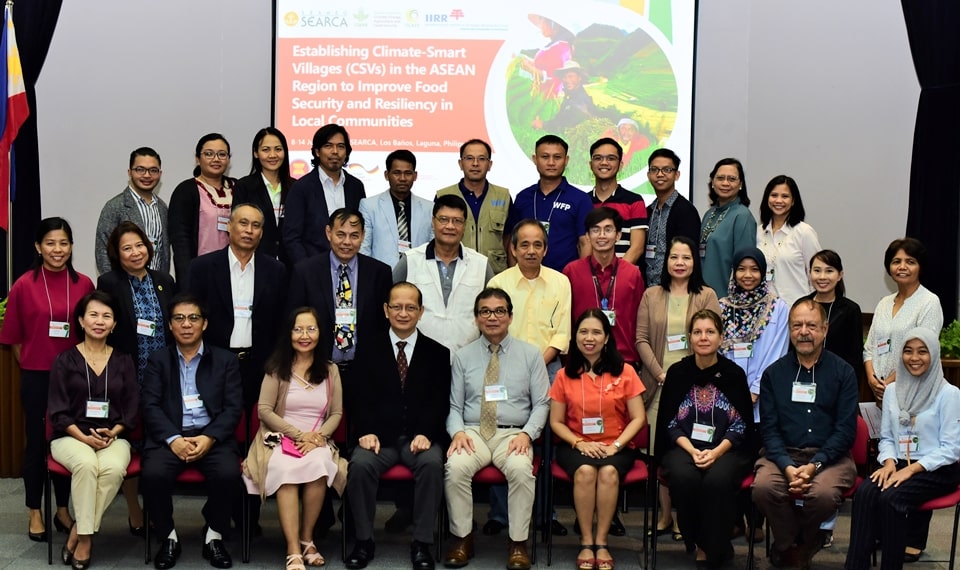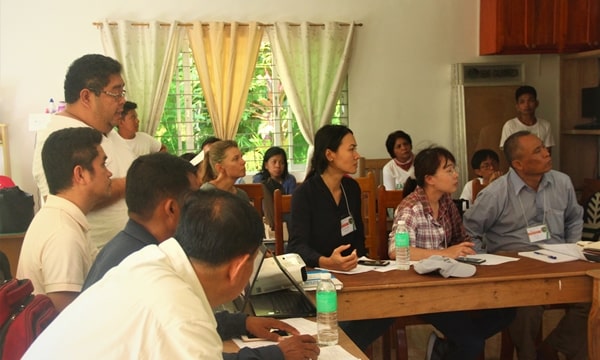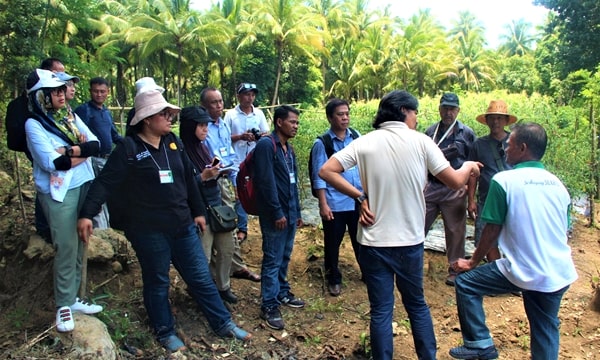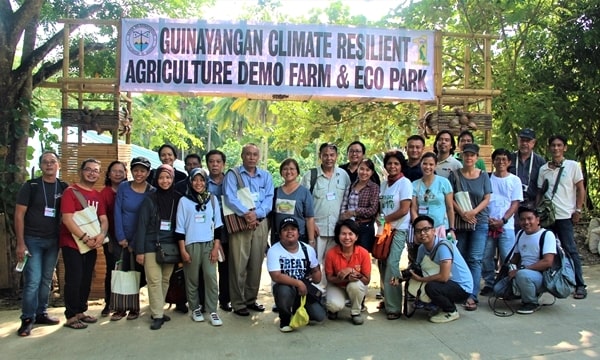 Participants of the workshop with representatives from SEARCA, IIRR, and CCAFS
Participants of the workshop with representatives from SEARCA, IIRR, and CCAFS
LOS BAÑOS, Laguna, Philippines – The Southeast Asian Regional Center for Graduate Study and Research in Agriculture (SEARCA), together with the International Institute of Rural Reconstruction (IIRR) and the CGIAR Research Program on Climate Change, Agriculture and Food Security (CCAFS SEA), organized a roving workshop on 9-13 July 2019 to demonstrate how local-level outscaling of climate-resilient agricultural practices can be undertaken under different agro-ecosystems and conditions in Guinayangan, Quezon Province.
Titled Establishing Climate-Smart Villages (CSVs) in the ASEAN Region to Improve Food Security and Resiliency in Local Communities, the workshop gathered 12 participants from the ASEAN Climate Resilience Network (ASEAN-CRN), specifically from Cambodia, Indonesia, Laos, Malaysia, Myanmar, the Philippines, and Thailand. Through field visits to key Guinayangan CSV sites, the workshop aimed to increase the participants' appreciation for CSVs and its potential to significantly improve food security in local communities in the face of heightened risks to agriculture-based livelihood due to changing climate.
CCAFS developed the CSV approach as a response to the need for context-specific solutions to climate risks at the local level, particularly to enable farmers to utilize experiential learning to weather the challenges posed by climate change and capacitate them in establishing their own CSVs in the future. Consequently, model CSV sites were established in Cambodia, Laos, Myanmar, the Philippines, and Vietnam to serve as platforms for CSA learning and community-based participatory action demonstrations.
During the opening program held at SEARCA Headquarters in Los Baños, Laguna, SEARCA Director Dr. Glenn B. Gregorio, through Dr. Maria Celeste H. Cadiz, head of SEARCA's Knowledge Management Department, underlined the close interconnection between climate and food security issues, as the changing climate poses greater risks over the agriculture sector, thereby compromising food security. Dr. Gregorio acknowledged that the battle against climate change is either won or lost at the grassroots level, where localized interventions assume a pivotal role.
Dr. Leocadio S. Sebastian, Regional Program Leader for CGIAR Research Program on Climate Change, Agriculture and Food Security in Southeast Asia (CCAFS SEA), similarly emphasized the crucial role of the village, the basic political unit of society, in national development. Dr. Sebastian added that the village is the "nucleus of social action," where real action toward climate change mitigation and adaptation, particularly community mobilization through CSV, starts. Borrowing from the old adage "It takes a village to raise a child," Dr. Sebastian said that it takes a village to scale CSA.
Meanwhile, Ms. Emilita Monville Oro, Country Director and Acting Regional Director for Asia of IIRR, shared the lessons learned from the implementation of the Guinayangan CSV. According to her, the CSV in Guinayangan, Quezon illustrates how the local government can utilize its natural resources toward addressing the impacts of climate change. She also emphasized the importance of building the capacities of communities and local government units in scaling up initiatives on climate-smart agriculture.
In his keynote address, Dr. Rex Victor O. Cruz, Professor and Director of the Environmental Forestry Programme of the College of Forestry and Natural Resources, University of the Philippines Los Baños, discussed the challenges, needs, and priorities in the ASEAN Region in the context of the current climate change scenario. Dr. Cruz related his experiences working with conservation farmers, saying that empowerment entails unlearning and learning processes. He also stated that establishing CSVs require climate-smart technical services, science and technologies, social relations, and governance.
The roving workshops
Module 1 of the workshop involved a discussion of the key concepts and elements of the CSV as an agricultural research for development approach to addressing climate change, food and nutrition security, and livelihood development. Participatory tools and experiences in establishing the context of CSV, particularly in the case of the Department of Agriculture's Adaptation and Mitigation Initiative in Agriculture (AMIA) villages and the Guinayangan CSV were also presented.
Module 2 tackled the emerging lessons from CSVs in Southeast Asia through a panel discussion, with Dr. Sebastian; Ms. Perla G. Baltazar, Senior Technical Officer, DA Systems-wide Climate Change Office; and Dr. Julian Gonsalves, Senior Adviser and CCAFS Project Leader, IIRR, serving as panelists. Meanwhile, Ms. Jana Patricia Koerner, CCAFS SEA Scaling Officer, elaborated on scaling considerations in CSV development.
Module 3 of the workshop consisted of roving workshops to various sites in Guinayangan, Quezon that showcase best practices in climate-smart agriculture. The first site was Barangay Cabong Norte, where participants learned about intercropping and other interventions in an upland agricultural system, with emphasis on corn production. This was followed by a field visit to Barangay Capuluan Tulon, which featured small-scale low external input, low carbon footprint methods of pig raising using resilient but improved native pig breeds as alternative source of livelihood of farmers. Next stop was the fishery and coastal agriculture site in Barangay Capuluan Central, showcasing initial work on coastal reforestation and diversification of livelihoods of coastal fishing families.
Local experiences and re-entry action planning
Guinayangan Mayor Cesar J. Isaac III shared the local government unit's experiences as regards the Green Fund (payment for ecosystem services) and water resource management during the field visit to the Maulawin Spring Protected Landscape. Participants then proceeded to learn about farmers' experiences regarding agroforestry and diversification in Barangay Sta. Cruz, specifically the production of chili peppers and linkage with the private sector in expanding their market. The demo farm and eco-park managed by the Office of the Municipal Agriculturist (OMA) of Guinayangan served as the final site of the roving workshop. En route back to Los Banos, participants made a quick stop at the National Swine and Poultry Research and Development Center and the Quezon Agricultural Research and Experiment Station in Tiaong, Quezon, where they learned about the various initiatives and milestones under the DA-AMIA Program, particularly the adaptation strategies and interventions implemented in the AMIA village in San Francisco, Quezon.
On the last day of the workshop, participants shared their best practices and experiences in CSA-related work followed by a plenary presentation of their re-entry action plan (REAP).
 Hon. Mayor Cesar J. Isaac III discusses Guinayangan's experience regarding the management of Maulawin Spring Protected Landscape and the utilization of the payment for ecosystem services (PES) or Green Fund.
Hon. Mayor Cesar J. Isaac III discusses Guinayangan's experience regarding the management of Maulawin Spring Protected Landscape and the utilization of the payment for ecosystem services (PES) or Green Fund.
 Participants visit the chili pepper farm of Mr. Placido Marjes in Brgy. Sta. Cruz, Guinayangan, Quezon.
Participants visit the chili pepper farm of Mr. Placido Marjes in Brgy. Sta. Cruz, Guinayangan, Quezon.
 Participants at the Guinayangan Climate Resilient Agriculture Demo Farm and Eco Park during the final leg of the field visits to the Guinayangan CSV.
Participants at the Guinayangan Climate Resilient Agriculture Demo Farm and Eco Park during the final leg of the field visits to the Guinayangan CSV.